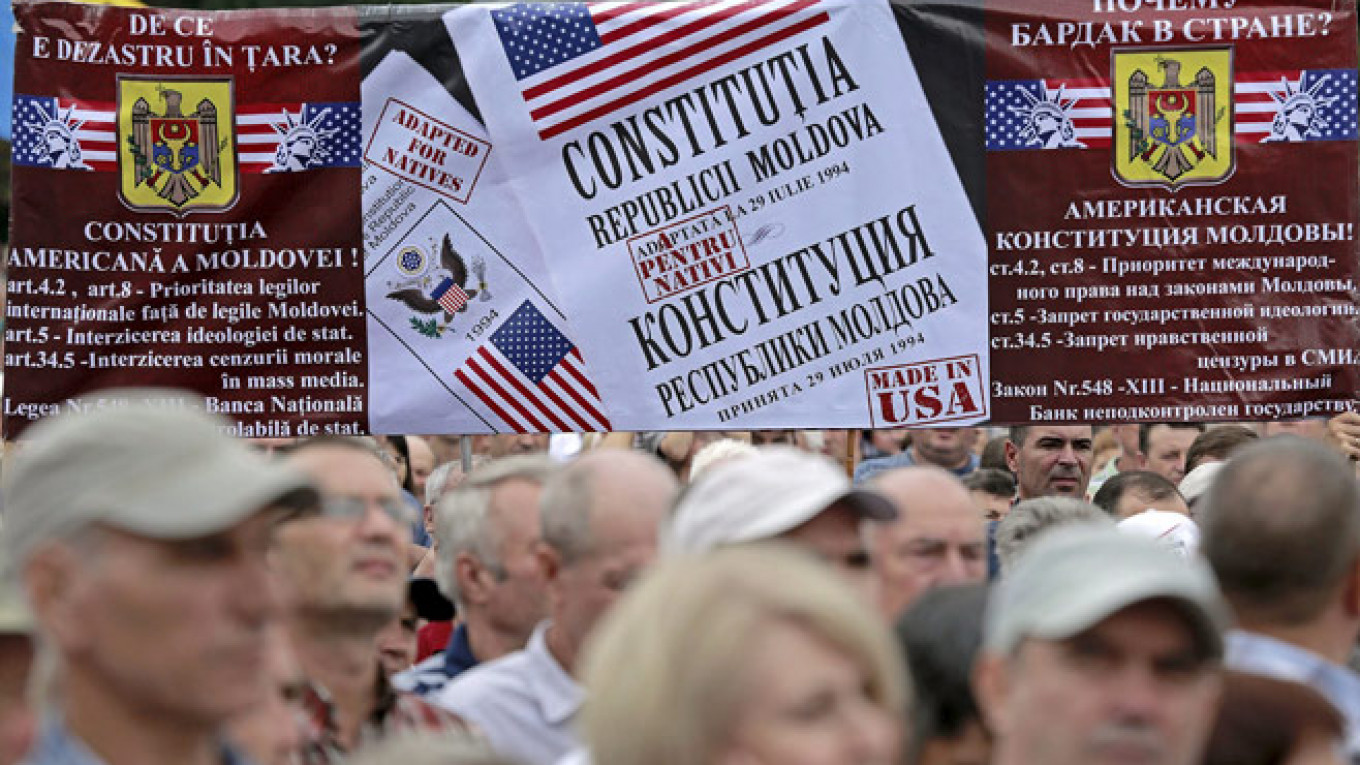Originally published by EurasiaNet.org.
The ongoing protest in the Moldovan capital Chisinau is posing a fresh test of Russian state-controlled media's ability to project Kremlin geopolitical preferences.
Regional analysts assert that Moscow is viewing the protest as another Western-orchestrated, Euromaidan-like disturbance that constitutes a threat to Russian national interests. Not surprisingly, then, Russian broadcasters and print outlets are striving to shape a news narrative in which the protest is an expression of the population's discontent with Moldova's European Union integration efforts.
In a Sept. 9 report distributed by the Russian state-run RIA Novosti news agency, Leonid Slutsky, chair of the Duma's Committee on Commonwealth of Independent States Affairs, claimed the EU did not present a solution to Moldova's economic woes.
"It's plain that the country has come to the point of collapse, and its people are in the mood for a U-turn in favor of the East," Slutsky stated.
The notion voiced by Slutsky — that conditions will improve for Moldovans only after they come to their senses and return to Russia's embrace — is the main meme pushed by Russian media in its coverage of the Chisinau events.
A report distributed by the TASS news agency, for example, quoted Konstantin Kosachev, chair of Russia's Federation Council Foreign Affairs Committee, as telling Moldovans "to put their interests first, which do not contradict Russian ones, despite what some people want to tempt citizens to think."
The other chief theme of Russian media reports concerns the supposedly nefarious intentions of the EU and United States. The protest aims to enable "the Americans" to "maintain Moldova within the Western sphere of influence," a Sept. 7 commentary published in the Moskovsky Komsomolets newspaper asserted.
The protest began September 7, and since then, the tent city established at Chisinau's Grand National Assembly Square has grown from a couple of dozen to roughly 150.
Protest participants scoff at the notion that they are disillusioned with the idea of EU integration. Marcel Lazar, a 22-year-old Chisinau native who has studied in France for the past three years, insisted the protesters were driven by a desire to promote clean government. "This protest has nothing to do with the EU, but with the economic situation in the country and with the 'theft of the century,'" he said, referring to the 2014 money-laundering scandal that sucked roughly $1 billion out of Moldovan banks.
Those at the center of events likewise are dismissive of Russian media accounts. "Protesters watch live shows on TV stations from Moldova and Romania, not from Russia," said one woman who gave her name as Aliona.
"Everyone asks us who we are and what we want — union with [EU member] Romania or to get closer to Russia and the Eurasian Union? We don't want either one or the other," asserted Anatoly, a middle-aged protester.
While Russian media may have no impact on the protesters themselves, its influence over the population as a whole, especially outside the capital, is much harder to measure. With discontent over the government's ability to manage economic policy deepening, many Moldovans may be open to Kremlin messages spread by Russian media.
The Moldovan government certainly appears wary of the risks posed by Russian media coverage. In Moldova, Russian television accounts for half of all cable channels.
In his Sept. 10 discussions with protest leaders, Prime Minister Valeriu Strelets appeared to cite Russian media meddling as a reason why his government is resisting calls to resign. "There are too many forces interested in destabilizing the situation in order to divert the country away from its strategic course to European integration," the Interfax news agency reported Strelets as saying.
On Sept. 6, Moldova denied entrance to broadcast journalists from one Kremlin-financed video agency (RT's Ruptly) and one Kremlin-sympathetic TV channel (LifeNews). Moldovan authorities said the journalists lacked proper accreditation. The Vesti news website criticized Moldovan authorities for not wanting "an objective reflection of events."
While the protest in Chisinau unfolds, tension between Moldova and Russia threatens to escalate over the separatist Transdnestr region. The Moldovan Defense Ministry has denied widespread Russian reports that the government declared Russia's military attache in Chisinau, Viktor Teleshev, persona non grata for his participation in Transdnestr's commemoration of the 25th anniversary of its declaration of independence from Moldova.
Such action on Moldova's part could prompt Russia to embrace an "asymmetrical" response, such as "a change in the formation of [Russian] peacekeeping forces in Transdnestr," political analyst Yevgeny Krutikov cautioned in a Sept. 10 commentary for the conservative-minded Vzglyad.
One Ukrainian analyst says it is difficult to predict what Moscow's next move concerning Moldova will be. "[Russian President Vladimir] Putin wants to understand how ready Europe is to get involved in the conflicts of countries which are located flush up against the EU's borders," wrote Viktor Kaspruk in a Sept. 8 commentary posted by the Glavnoye website. "He will test Moldova itself, to see how it'll be able to defend itself."
Originally published by EurasiaNet.org.
A Message from The Moscow Times:
Dear readers,
We are facing unprecedented challenges. Russia's Prosecutor General's Office has designated The Moscow Times as an "undesirable" organization, criminalizing our work and putting our staff at risk of prosecution. This follows our earlier unjust labeling as a "foreign agent."
These actions are direct attempts to silence independent journalism in Russia. The authorities claim our work "discredits the decisions of the Russian leadership." We see things differently: we strive to provide accurate, unbiased reporting on Russia.
We, the journalists of The Moscow Times, refuse to be silenced. But to continue our work, we need your help.
Your support, no matter how small, makes a world of difference. If you can, please support us monthly starting from just $2. It's quick to set up, and every contribution makes a significant impact.
By supporting The Moscow Times, you're defending open, independent journalism in the face of repression. Thank you for standing with us.
Remind me later.


